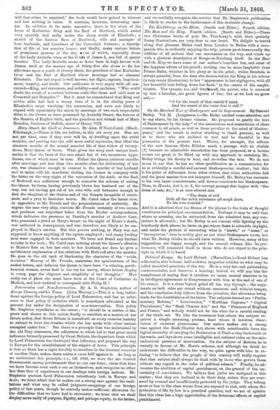On the Received Text of Shakespeare and its Improvement. By
Samuel Bailey. Vol. II. (Longman;.)—Mr. Bailey excited some attention, not to say alarm, by his former volume. He proposed to purify the text of Shakespeare by the help " of the associations and connections of ideas. common to all minds, as well as those peculiar to the mind of Shakes- peare," and the result is rather startling to timid persons, as well as to those who are inclined to rest and be thankful in the, possession of the present text. Where, for example, the editors. of the now famous Globe Edition mark a passage with an obelisk (t) because no admissible emendation has been proposed, or a lacuna. occurs too great to be filled up with any approach to certainty, Mr.. Bailey brings his theory to bear, and re-writes the text. We do not mean to say that he has no other qualification as a commentator, for he is evidently a careful and earnest Shakespearian student ; but this. is his point of difference from other critics, that when authorities fail and the 'great master does not interpret himself, Mr. Bailey has recourse• to his own inner consciousness, and thence constructs his Shakespeare. Thus, in Hamlet, Act 1, sc. 4, the corrupt passage that begins with "the, dram of eale, thc„" is at once altered into ." The dram of evil Doth all the noble substance of4 weigh down, To his own scandal."
And it is admitted that the fitness of the phrase to the train of thought constitutes its principal recommendation. Perhaps it may be said that where no meaning can be extracted from the 'admitted text, any 'con- jecture is allowable ; but Mr. Bailey is not content with lighting up the• hopelessly dark places, he turns on gas where there is tolerable daylight, and under the pretext of •correcting what is "harsh," or "tame," or "incongruous," does in reality give us not what Shakespeare wrote, but. what Mr. Bailey thinks he should have written. However, many of the suggestions are happy enough, and the second volume, like its pre- decessor, will commend itself to those who do not object to the prin- ciple ou which it is based.






























 Previous page
Previous page